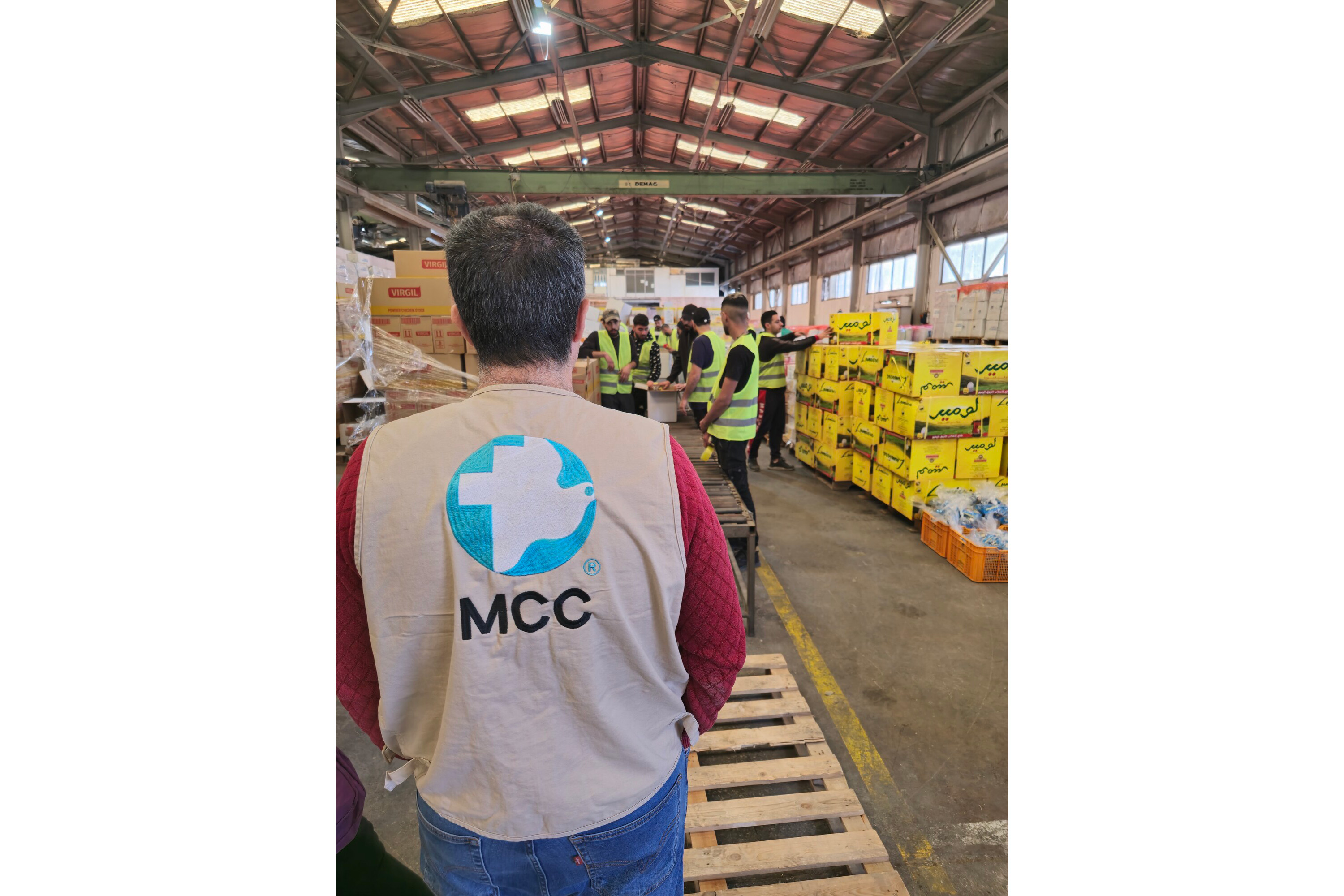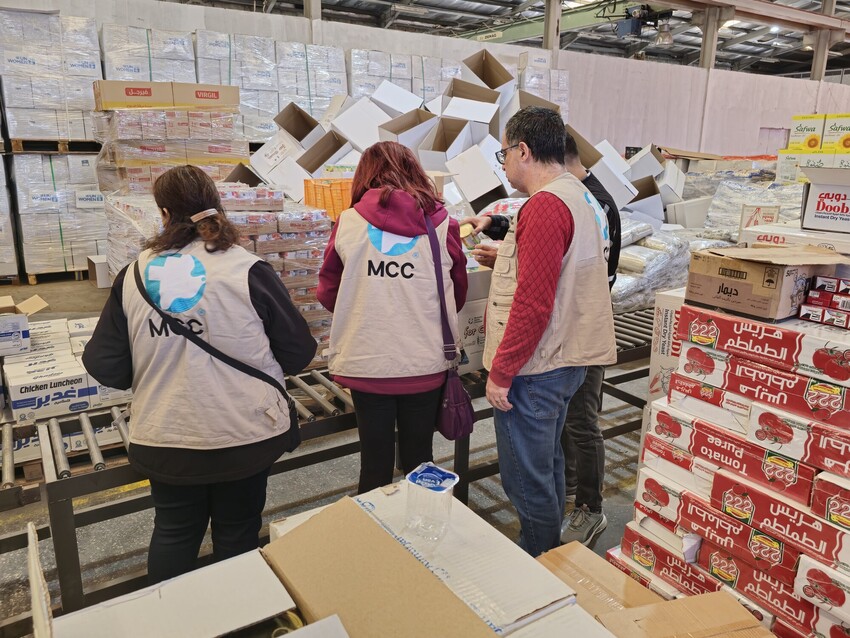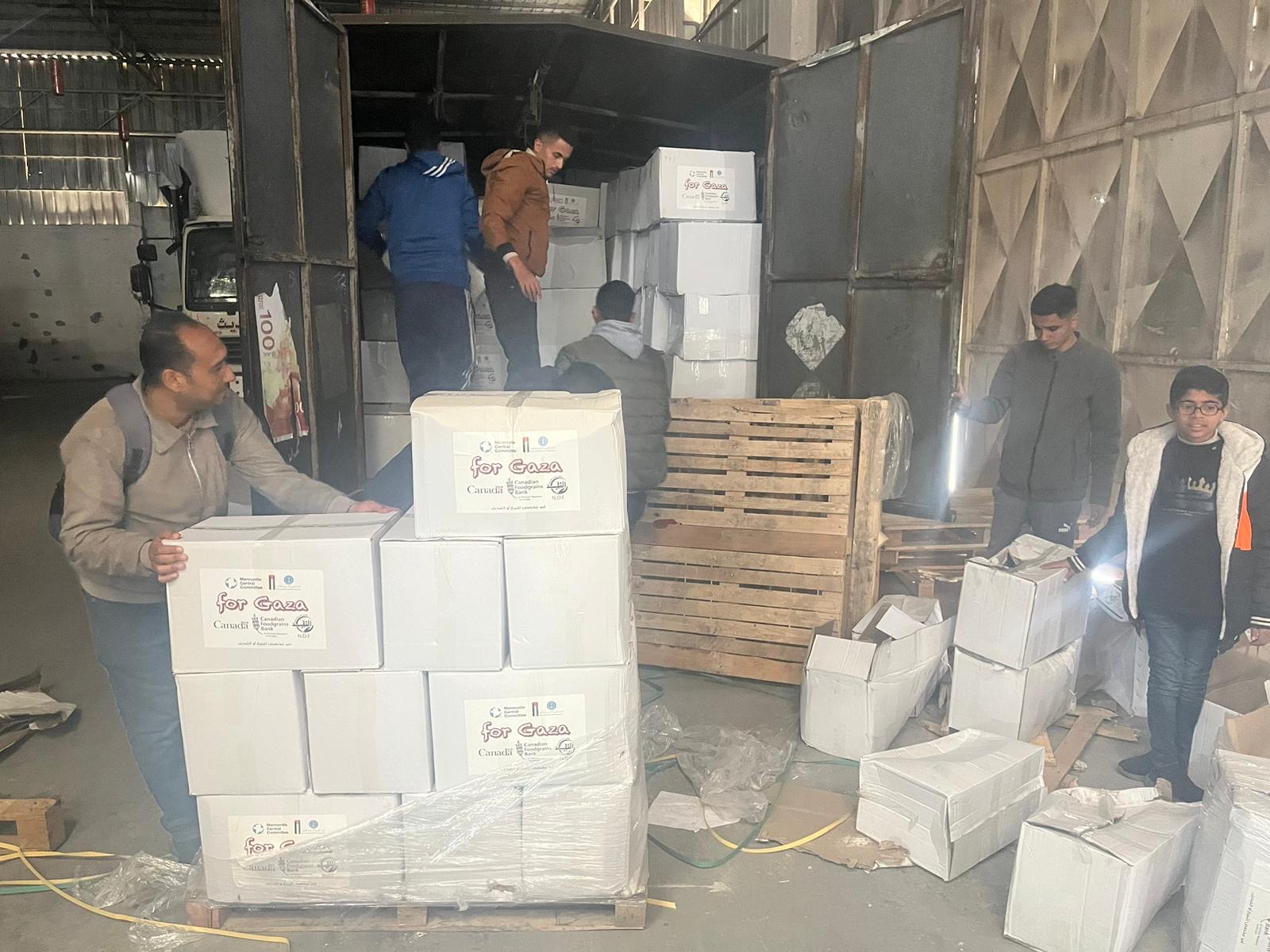MCC shipment of food crosses border into Gaza

With famine imminent in Gaza, MCC has delivered a critical truckload of emergency food for besieged families. As part of a convoy of other trucks transporting humanitarian relief via Jordan, the vehicle sat for more than a week waiting to cross the border but finally made its way through the Kerem Abu Salem crossing into Gaza on March 19.
MCC partner Al-Najd Developmental Forum (Al-Najd) received the lifesaving delivery from the first of six planned truckloads, including locally purchased food such as chickpeas, lentils, rice, flour, cooking oil, canned meat, fish and beans. The packages will be delivered to 665 displaced families currently living in tent camps in Deir al Balah and other locations between Gaza City and Rafah, known as the “Middle Area” of the Gaza Strip. It’s harder for families living in the Middle Area to access humanitarian relief than it is for those who fled further south.
“The process for getting the goods into Gaza has been full of ups and downs,” says Sarah Funkhouser, MCC representative for Jordan, Palestine and Israel along with her husband Seth Malone. “We’ve been blessed to work with a great partner in Jordan, but the restrictions imposed by the Israeli authorities have caused delays that have been difficult to work around.”

After weeks of unsuccessfully navigating complicated logistics to bring a shipment of food through the Rafah crossing into Gaza through Egypt, MCC was able to connect with a partner in Jordan to bring food supplies through the Kerem Abu Salem crossing instead. Once the supplies were purchased in Jordan, MCC staff from the Jordan, Palestine and Israel team inspected the items and hand-packed the food into boxes for distribution.
It was a meaningful and tangible way for MCC staff to engage, after working so hard to coordinate and overcome numerous obstacles. While they couldn’t cross the border themselves, the staff knew the packages would carry love to families in need.

“As a Palestinian, I was happy to help check and pack food boxes for our sisters and brothers in Gaza, knowing that every item in the box we picked together is greatly needed,” says an MCC staff* who helped pack the food packages. “Every day we pray for justice and peace and for equal human rights and dignity.”
But once the packages were assembled, it still wasn’t a straightforward journey across the border. Intense restrictions by the Israeli government on supplies going into Gaza meant there have been significant delays at the border. The convoluted and time-intensive inspections have led to a long queue of trucks waiting to cross. Due to seemingly arbitrary decisions by the Israeli authorities, many transport trucks carrying life-saving supplies have been turned away at the crossings, unable to unload their shipments. MCC’s shipment of much-needed food packages sat in a warehouse for three weeks until it was cleared to enter the long line of trucks waiting to cross into Gaza.
When the truck finally made it across the border, Al-Najd staff had only a few hours to unload the supplies from the transport truck into smaller vehicles. Those vehicles would then bring the packages the rest of the way to families in dire need in the Middle Area.
Hunger at a crisis level in Gaza
For the approximately two million Palestinians trapped in Gaza, every conceivable resource is scarce. Food, drinking water, medicine, safe shelter — all are in dangerously short supply as the Israeli military continues its ground offensive and bombardment of Gaza. The entire population of Gaza is facing crisis-level hunger, with more than 677,000 experiencing a catastrophic level of food insecurity, on the brink of famine.
“The situation in Gaza is dire and we are so thankful to be able to provide this relief to families who are in a desperate situation. We are having a real material impact for these families, but do not want to downplay how severe the crisis is for most families in Gaza,” says Funkhouser.
And while MCC and many other organizations continue to advocate to governments for a ceasefire and humanitarian access, the Israeli government has tightened its embargo on the Gaza Strip, severely limiting the import of essential supplies into Gaza.
MCC plans to send a further five shipments of emergency food to support 2,000 families — approximately 12,000 individuals — over the course of the project. This relief is specifically directed towards families with exceptional needs, including families that have lost their primary caregivers, have members hospitalized or families with special needs like diabetes, disabilities or other sicknesses.
To avoid the looting that can accompany food deliveries in situations this desperate, the truck deliveries will be staggered so that food baskets are distributed quickly and in smaller batches. Additionally, Al-Najd’s connection to community networks allows their staff to manage the risk of violence more effectively.

This project is part of a CDN $1.6 million (USD $1.2 million) project funded through MCC’s account at Canadian Foodgrains Bank. This includes funding from the Humanitarian Coalition and matching funds from the Government of Canada. It’s also supported by generous donors who have given to MCC’s emergency response in Gaza. You can provide continued support for this work by donating online here.
“The steadfastness and dedication of our partners — they are incredible people who have been forced to operate in an impossible environment,” says Funkhouser. “They have provided hope to us and the least we can do is provide hope to them. We are grateful that the Foodgrains Bank, the Government of Canada and MCC supporters have facilitated this work to happen, and we will continue to work for and pray for an end to the violence and for a just peace.”
“The humanitarian need remains massive,” says MCC’s disaster response director, Bruce Guenther. “The international community and the Israeli government must act to prevent genocide and famine in Gaza. We will continue to advocate strongly for a ceasefire, adherence to international humanitarian law and for a long-term, just peace.”
Canadians can take action here and people in the U.S. can advocate for a ceasefire here and for restoring funding for UNRWA here.
*Some names have been withheld for security purposes
Top photo caption: An MCC staff* observes workers packing emergency food packages in Amman, Jordan, to be dispatched to Gaza as part of an initial pilot shipment of 665 food packages. (MCC photo/Marc Falconer)

